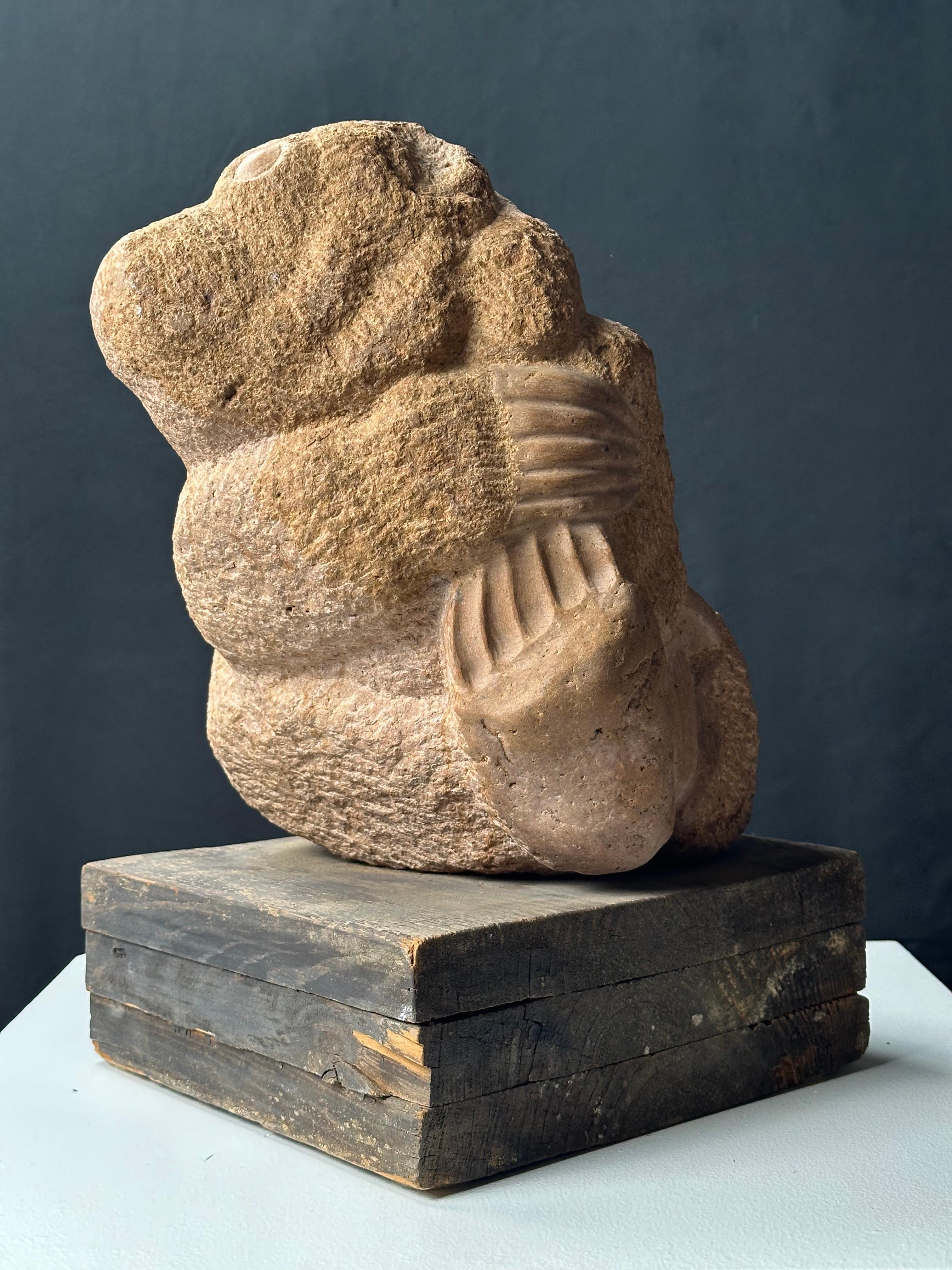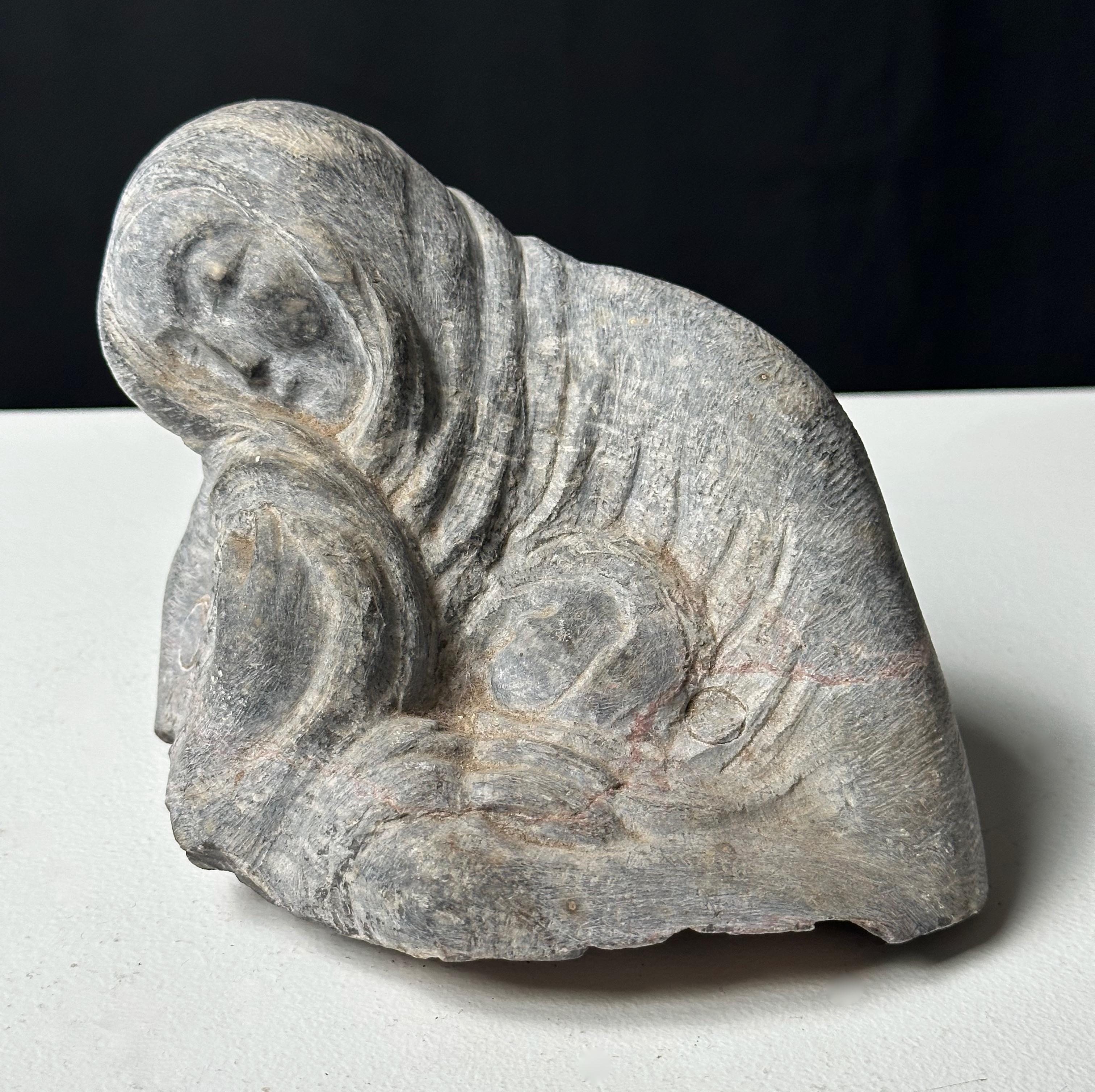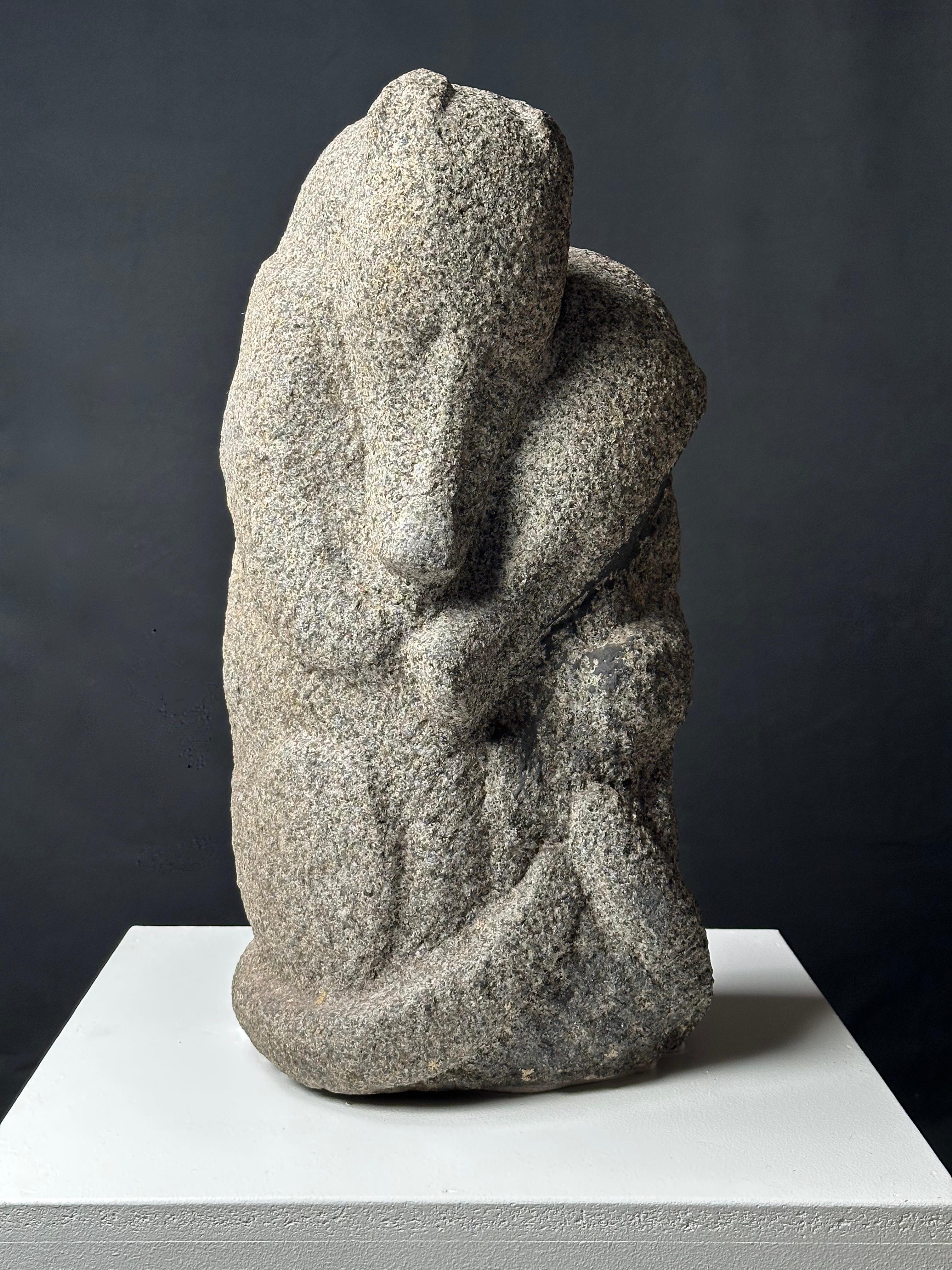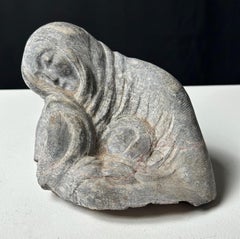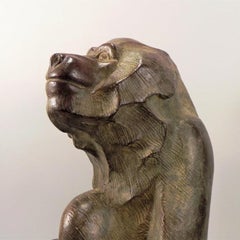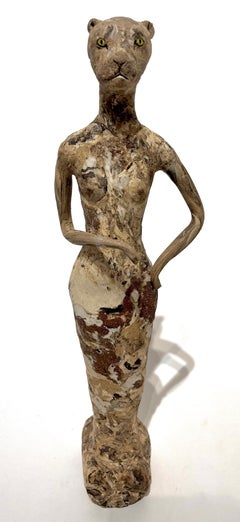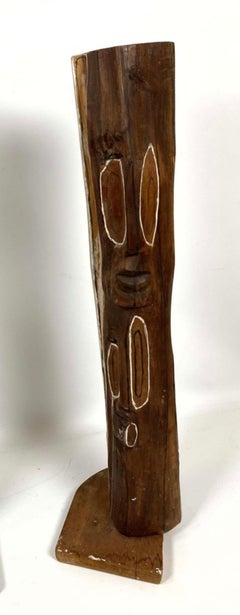Want more images or videos?
Request additional images or videos from the seller
1 of 13
Mark MorrisonBaboonca. 1940
ca. 1940
$2,500
$5,00050% Off
£1,842.62
£3,685.2350% Off
€2,126.82
€4,253.6350% Off
CA$3,448.10
CA$6,896.1950% Off
A$3,596.52
A$7,193.0550% Off
CHF 1,951.38
CHF 3,902.7650% Off
MX$43,688.99
MX$87,377.9850% Off
NOK 24,358.21
NOK 48,716.4250% Off
SEK 22,428.81
SEK 44,857.6250% Off
DKK 15,880.12
DKK 31,760.2450% Off
About the Item
Mark Morrison (1895-1964)
Baboon, ca. 1940
Carved and weathered Walnut
12" wide, 12" deep, height is 26.5"
Please note the bottom surface is not perfectly flat and the piece leans to right. For display, we suggest a small 1/2 inch wood shim inserted beneath as we did in our listing photos here.
Provenance: Estate of Mrs. Mark Morrison.
Born:
Kingfisher, OK
Education:
University of Missouri
John Flannagan, mentoring and private instruction ca. 1940
Art Students League with William Zorach and Jose de Creeft
Exhibited:
Sculpture Guild Annuals
Audubon Artists Annuals
National Academy of Design Annuals
Pennsylvania Academy Annuals
Metropolitan Museum Artists for Victory, 1942.
Newark Fine Arts Museum
Whitney Annuals
International Exhibition, Fairmount Park, Phila. 1950
Nebraska Fine Arts
Metropolitan Museum Exhibition, 1951
Boston Arts Festival
National Sculpture Society Annuals
Memberships:
Sculpture Guild, Inc.
Audubon Artists
Awards:
Ellen Prince Speyer Award, N.A. 1950
Architects League of New York, Avery Award, 1958, 1959.
Museum Collections:
Metropolitan Museum of Art
National Academy of Design
Pennsylvania Academy of Fine Arts
Whitney Museum of American Art.
Museum of Fine Arts, University of Arizona
Mark Morrison began his life as a sculptor while nearing his professional retirement. In the late 1930s and into the 1940s, he like many of the younger artists in New York City availed himself to the great many academies, museums, teachers and mentors it offered. He studied with John Flannagan before his death, and then Jose de Creeft and Williams Zorach at the Art Students League. Having an attraction and aptitude for the ideas of the direct carving movement and good thorough craft, he took advantage of the growing public interest in a new American sculpture, and worked quickly to become a contemporary of his teachers. Through the 1950s, he exhibited with them, sold, entered competitions, and won awards. He was a sculptor with a sure hand, a head for academy, patience, and promise. Morrison died suddenly in October 1964 having had just married his second wife earlier the same year. Mrs. Mark Morrison would offer a small piece for one more exhibition with a Sculptors Guild in 1965. The work was never seen again until 2025.
Morrison was born on New Year’s Day in 1895 in Kingfisher, Oklahoma, a small rural city not yet a part of the Union. The only child of a Protestant minister, and one of only 16 that in 1913 would graduate from his high school in Higginsville, Missouri. He studied agriculture at the University of Missouri, at some point leaving to enlist in the army. He would reach the rank of Major. After the war, he married his first wife, moved to New York and began work for Tidewater Oil. He worked with them until 1954, retiring as a vice president. At the time he was living at 8 W. 13th St., his studio already set up in a corner of the basement in his apartment building.
The earliest exhibition on record for a work by Morrison was the Artists for Victory show at the Metropolitan Museum, 1942. Earlier the same year, John Flanagan committed suicide. The death was a terrible blow. Flannagan had been a profound influence, sharing both technical instruction and philosophical guidance. The importance of their friendship during the 1930's cannot be overemphasized. Morrison is part of Flannagan's artistic legacy, his only known pupil during the mythical sculptor's short life. Born in the same year of 1895, both artists came to NYC from rural regions of the US: Oklahoma and North Dakota respectively. In contrast to Morrison's stable life, Flannagan was a deeply troubled, difficult, impatient and unpredictable man. To have considered mentoring Morrison, his teacher must have seen a kindred spirit and artist of extraordinary potential. In turn, Morrison must have been a sympathetic and patient pupil who recognized the importance of overlooking personal shortcomings for the invaluable instruction of an artistic genius.
Morrison did not show regularly for almost 10 years spending this time educating himself, exhibiting here and there. He continued his sculpture studies at the Art Student League with Zorach and de Creeft, spending most nights working stones in his studio. His mature style would become clearly realized by 1950, a synthesis of the naïve and the sophisticated, what Flanagan called "the image in the rock", and the polished fluid marbles of Zorach.
Black Swan was featured in the Sculptors Guild exhibition "In Time and Place" at the Museum of Natural History in March 1952. And exhibit pushing those points in their mission to assist the public to fuller appreciation of sculpture, and that the sculpture and the architecture of buildings may again be planned simultaneous and homogeneously. Morrison's swan was the centerpiece of the modern living room designed by Earnshaw, Inc. In the same hall of the museum one year earlier Morrison and other members of the group demonstrated process at work in seven makeshift studios. He would continue to exhibit in Guild annuals and Audubon Artist annuals. His sculpture "Gosling" was given a special honorable mention from the Architects League in the Avery Competition of 1958, runner up to Zorach. In 1959, when he showed "Grasshopper" he won outright.
He had moved his studio to a larger more private space a few blocks away in Greenwich Village. By 1964 his work had become larger in scale, his groupings more challenging and lively, more considerate of light and the nature of the stone itself. He had lost weight and for a man of nearly 70 years old was in very good health. His death was unexpected and unfortunate, probably of a stroke . His legacy has survived, largely unknown until now in a small ranch in upstate New York.
- Creator:Mark Morrison (1895 - 1964, American)
- Creation Year:ca. 1940
- Dimensions:Height: 26.5 in (67.31 cm)Width: 12 in (30.48 cm)Depth: 12 in (30.48 cm)
- Medium:
- Movement & Style:
- Period:
- Condition:
- Gallery Location:Wilton Manors, FL
- Reference Number:1stDibs: LU245216317692
About the Seller
4.9
Platinum Seller
Premium sellers with a 4.7+ rating and 24-hour response times
Established in 2007
1stDibs seller since 2015
451 sales on 1stDibs
Typical response time: 2 hours
- ShippingRetrieving quote...Shipping from: Reading, PA
- Return Policy
More From This Seller
View AllMonkey
Located in Wilton Manors, FL
Mark Morrison (1895-1964)
Monkey, ca. 1940
Carved New Hampshire granite
8.5" by 5", height is 16.5"
Provenance: Estate of Mrs. Mark Morrison.
Born:
Kingfisher, OK
Education:
...
Category
Mid-20th Century Realist Sculptures
Materials
Granite
$4,000 Sale Price
50% Off
Cinnamon Bear
Located in Wilton Manors, FL
Mark Morrison (1895-1964)
Cinnamon Bear, ca. 1950
Carved red granite
11" wide, 11" deep, height (including wood base) is 15"
Provenance: Estate of Mrs. Mark Morrison.
Born:
...
Category
Mid-20th Century Realist Sculptures
Materials
Granite
$2,500 Sale Price
50% Off
Madonna
Located in Wilton Manors, FL
Mark Morrison (1895-1964)
Madonna, ca. 1940
Carved stone
7" wide, 5" deep, height is 4.5"
Provenance: Estate of Mrs. Mark Morrison.
Born:
Kingfisher, OK
Education:
Univers...
Category
Mid-20th Century Realist Sculptures
Materials
Stone
$1,600 Sale Price
60% Off
Mountain Goat
Located in Wilton Manors, FL
Mark Morrison (1895-1964)
Mountain Goat, ca. 1940
Carved diorite
3 7/8" wide, 2.5" deep, height is 3"
Provenance: Estate of Mrs. Mark Morrison.
Born:
Kingfisher, OK
Educatio...
Category
Mid-20th Century Realist Sculptures
Materials
Stone
$1,000 Sale Price
50% Off
Dodo Bird
Located in Wilton Manors, FL
Mark Morrison (1895-1964)
Dodo, ca. 1940
Carved granite
7.75" wide, 5" deep, height is 7"
Provenance: Estate of Mrs. Mark Morrison.
Born:
Kingfisher, OK
Education:
Univers...
Category
Mid-20th Century Realist Sculptures
Materials
Granite
$1,600 Sale Price
60% Off
Platypuses
Located in Wilton Manors, FL
Mark Morrison (1895-1964)
Platypuses, ca. 1940
Granite
10.25" wide, 8" deep, height is 20.5"
Very heavy, dense stone. Weighs approx. 125-150 lbs.
Provenance: Estate of Mrs. M...
Category
Mid-20th Century Realist Sculptures
Materials
Granite
$2,800 Sale Price
65% Off
You May Also Like
Akop GURDJAN (après) (1881-1948) Sitting Baboon Bronze
Located in Gent, VOV
Akop GURDJAN (après)(1881-1948) Sitting Baboon Bronze
Akop Gurdjan (1881-1948)
Akop Gurdjan (also Hakob Gyurjyan) was born in Shusha (Nagorno Karabakh)...
Category
19th Century Figurative Sculptures
Materials
Bronze
Cat
By Robin Whiteman
Located in Bozeman, MT
Robin has worked with clay since the age of eleven. Her sculptures have ranged in size from life sized sculptures to the diminutive porcelain pieces. She has been a resident artist a...
Category
2010s Contemporary Sculptures
Materials
Clay, Glaze
$2,500
Observation
By Gerald Balciar
Located in Colorado Springs, CO
Artist has inscribed their signature and edition number on the bronze base of this sculpture.
16/20
Category
21st Century and Contemporary Realist Sculptures
Materials
Bronze
Modernist Face
By Itzhak Sankowsky
Located in Los Angeles, CA
ITZHAK SANKOWSKY
"MODERNIST FACE"
WOOD, SIGNED
ROMANIAN-AMERICAN, C.1940
24.5 INCHES
Itzhak Sankowsky was born in 1908 in Romania.
He lived and was active in Philadelphia, Penn...
Category
1940s Modern Figurative Sculptures
Materials
Wood
$935 Sale Price
35% Off
Goat II
By Robin Whiteman
Located in Bozeman, MT
Robin has worked with clay since the age of eleven. Her sculptures have ranged in size from life sized sculptures to the diminutive porcelain pieces. She has been a resident artist a...
Category
2010s Contemporary Sculptures
Materials
Clay, Glaze
Gorille
By Jorge Borras
Located in Pasadena, CA
After completing his studies at the Royal Catalan Academy of Fine Arts in Sant Jordi, Barcelona, Jorge Borrás moved to France1.
His works, especially his bronzes, are sold in major auctions mainly in France (Versailles, Drouot, Saint Germain En Laye, Enghien les Bains, etc. June 30, 1992, two bronzes were sold at Christie's in London) 2. They are exhibited in Parisian salons such as the Salon d'automne3, the Salon des artistes français, the Salon des Independants the exhibitions of the National Society of Fine Arts, the Salon de l'école française [ref. necessary].
He received the Arts-Sciences-Lettresn 1 Medal and is a member of the International Association of Visual Arts (affiliated with UNESCO).
In addition, he produced a series of medals and sculptures for the Monnaie de Paris, and various achievements such as the bust of Dr. Coll Colomé, a monument erected in Benicarlo (Spain) and publishing covers including the novel by Jean-Marc Roberts Vincent's friend.
The work of Jorge Borrás is a tribute to the woman [ref. necessary]. Her favorite themes are ballerinas and bathers as well as women in everyday attitudes. Wild animals, some endangered, are also very present in the work of Jorge Borrás, especially in recent years where he takes great pleasure in capturing the wild moment of his attitudes.
Passionate about drawing, he began painting at the age of ten and made his first exhibition at the age of twenty.
At the School of Fine Arts in Barcelona, he discovered sculpture with Luisa Granero and studied painting and sculpture.
The students the drawing section, of the great master of Spanish painting and portrait painter Francisco Ribera Gomez...
Category
2010s Contemporary Figurative Sculptures
Materials
Bronze
$8,800 Sale Price
20% Off
